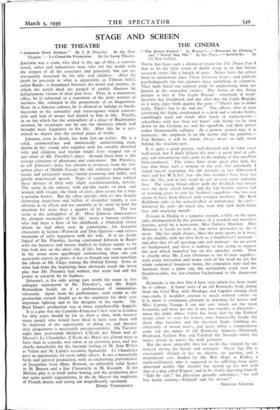STAGE AND SCREEN
THE THEATRE
Johnson Over Jordan." By J. B. Priestley. At the New Theatre.—La Cornedie Francaise. At the Savoy Theatre.
JOHNSON was a clerk, who died at the age of fifty, a conven- tional, sober and industrious man who left the world with
the respect of all his associates and genuinely but not ex- travagantly mourned by his wife and children. After his death he proceeds to what is apparently, in Tibetan belief, called Bardo: a dreamland between the world and eternity, in which the newly dead are purged of earthly illusions by hallucinatory visions of their past lives. First, in a monstrous office, he is subjected to a repetition of the daily worries of business life, enlarged to the proportions of an Inquisition. Next, in a hideous cabaret, he is allowed to indulge to break- ing-point in the sensuality and extravagance which conven- tion and lack of means had denied to him in life. Finally, in an inn which has the atmosphere of a place of Buchmanite reunion, he recaptures one by one the moments, which had brought most happiness to his life. After this he is per- mitted to depart into the eternal peace of limbo.
Johnson, even in death, has both feet on reality. He is a solid, commonplace and intrinsically uninteresting man, drawn in the round, who together with his amiably sketched wife and children and friends might have stepped out of any other of Mr. Priestley's plays. Around them here is the strange company of phantoms and caricatures. Mr. Priestley, to tell Johnson's story, has chosen to resurrect from the for- gotten plays of Middle Europe the old, unhappy technique of masks and percussive music, fateful posturing and ballet, and grimly nonsensical speech. Years of repetition have robbed these devices of their only slight recommendation, novelty. The scene in the cabaret, with pig-like masks on men and women with visages like birds of prey, does create for a time a genuine horror. But the office episode, with its two sharply chattering inquisitors and ballets of mournful typists, is too obvious in its effects and too unsubtle in its satire to hold the attention for more than a quarter of its length. The last scene is the unhappiest of all. Here Johnson reencounters the pleasant memories of his life : meets a famous cricketer who had been a hero of his childhood, a whimsical clown whom he had often seen in pantomime, his favourite characters in fiction—Pickwick and Don Quixote—and relives moments of early happiness with his wife. It is no doubt logical of Mr. Priestley, having confronted Johnson in Bardo with the baseness and misery implicit in human nature to let him look also on the other side of life; but this scene proved in the event more appallingly embarrassing than one can accurately convey in print—it was as though one were watching the effects of Mr. Chips joining the Oxford Group. Even in what had from the beginning been obviously much the worst play that Mr. Priestley had written, this scene had still the power to astonish by its badness.
Johnson's is the only acting part worth the name in this unhappy experiment of Mr. Priestley's, and Mr. Ralph Richardson builds on it a performance of tremendous virtuosity. Apart from his performance, such credit as the production earned should go to the engineers for their very ingenious lighting and to the designer of the masks. Mr. Basil Dean's production was at times reprehensibly sluggish.
It is a pity that the Comedie-Francaise's first visit to London for fifty years should be for so short a time, both because many people who would have liked to have seen them will be deprived of the opportunity of doing so, and because their programme is necessarily unrepresentative. On Tuesday night they performed Moliere's L'Ecole des Maris and de Musset's Le Chandelier. L'Ecole des Maris was played more as farce than as comedy, was taken at an alarming pace, and was chiefly remarkable for the buoyant fooling of M. Jean Weber as Valere and M. Lafon's eccentric Sganarelle. Le Chandelier gave an opportunity for more subtle effects. It was a beautifully fresh and spirited production, with an enchanting performance of Jacqueline from Mme. Renaud, an admirably solid Andre in M. Brunt and a fine Clavaroche in M. Escande. If the Moliere play is in itself rather boring, and the production does not quite justify expectations, in the de Musset the traditions of French drama and acting are magnificently sustained.
DEREK VERSCHOYLE.


























































 Previous page
Previous page